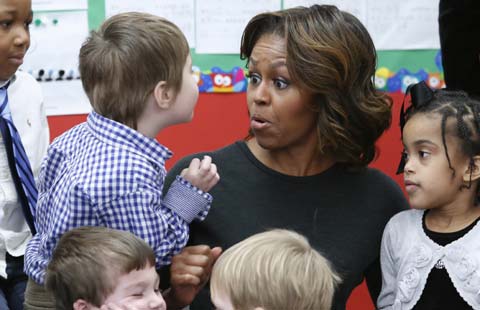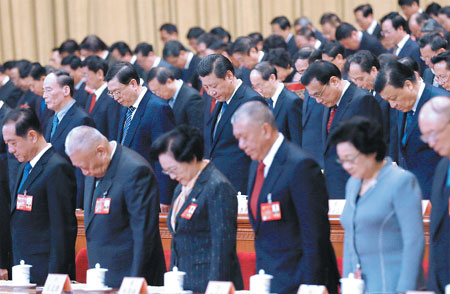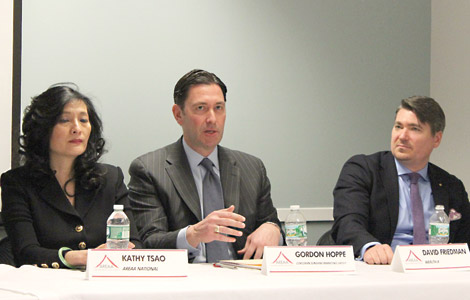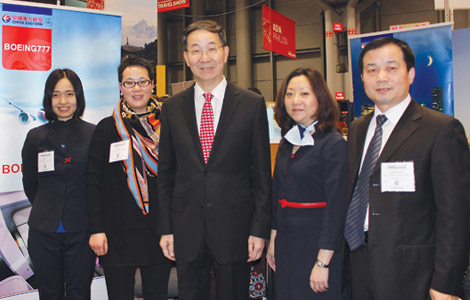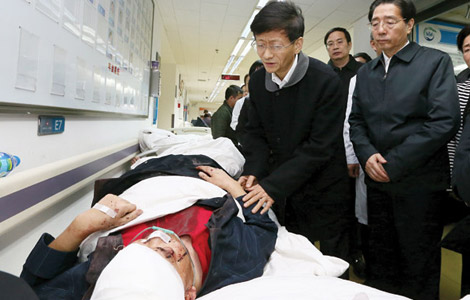Smoke-free two sessions drive making progress
Updated: 2014-03-06 08:33
By Shan Juan (China Daily)
|
||||||||
NPC deputy Chen Zhimin said she welcomed a smoke-free two sessions. "I haven't seen any deputies smoking in the hotel so far this year and I hope that will become the norm in the future. It helps the environment and public health," she said, adding that smoking is only allowed in an open space outside her hotel.
Wu Yiqun, deputy director of Think Tank, an NGO committed to greater controls on tobacco and smoking, said: "A clear definition of designated smoking areas is helpful in better implementing a smoking ban."
The new norm
Wang noted that hospitals, schools, and the offices of the top health and education authorities are now smoke-free zones. "Other departments are welcome to follow up and pass on the healthy message," he said. "Starting from these two sessions, the new norm will spread to other government working establishments."
Zhong Nanshan, an NPC deputy from Guangdong, said strong government commitment is key to successful tobacco control in China.
According to Wu Yiqun, more key measures are needed, including graphic health warnings on cigarette packs and raising the tax paid on cigarettes. The retail price of tobacco products should also be raised, she added.
China's implementation of the WHO framework is primarily led by the Ministry of Industry and Information Technology, which oversees the State Tobacco Monopoly Bureau, or the China National Tobacco Corporation.
Wu said it would be better if responsibility for the implementation were to be placed in the hands of healthcare professionals to promote more effective control of tobacco products.
"The top health authority would be a better fit for this leading position," she said.
Shin from the WHO called on China to "overcome 'competing interests' to enforce stronger tobacco control policies and measures".
The Chinese government has a monopoly in the tobacco industry, which is a major contributor to the nation's coffers. In 2013, nearly 956 billion yuan ($157 billion) in taxes and profits was generated by the industry, a 10.5 percent year-on-year rise, Ling Chengxing, director of the State Tobacco Monopoly Administration, told a national work conference last month. The industry handed over 816 billion yuan in profits and taxes to the government last year, a 13.9 percent rise from 2012.
Wu Yiqun said that the glare of the media spotlight means a smoke-free two sessions could help to substantially raise public awareness about the dangers associated with the habit. At the very least, she said. "One should smoke in a civilized and polite way, never harming nonsmokers' rights to a smoke-free environment indoors."
While the reaction to the ban has generally been positive, some delegates urged their colleagues to show tolerance.
A CPPCC member who declined to be named said that quitting is difficult, especially for long-time smokers, and it will take time for them to stop entirely.
"The health hazards are well known, but don't be too harsh on the smokers. It really takes time to quit and accept what is now the social norm," he said, pointing out that times change and former State leaders, such as Mao Zedong and Deng Xiaoping, were smokers.
"To show respect for other people and the environment, I only smoke at the designated areas," he said.
Contact the writer at shanjuan@chinadaily.com.cn
Most Viewed
Editor's Picks

|

|

|

|

|

|
Today's Top News
Chinese firm acquires Texas oil, gas company
Chinese firm buys two new helicopters from US' Bell
Obama releases budget request
Peace quest spurs defense push
US first lady to visit China
Obama, Merkel discuss Ukraine crisis
Obama releases budget request
China embraces market forces
US Weekly

|

|


